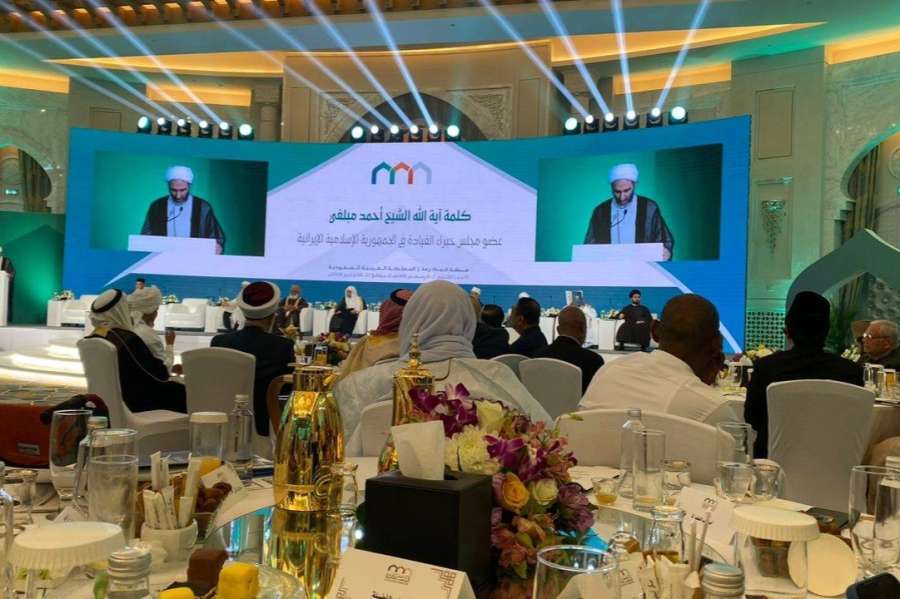The international conference titled “Building a bridge of solidarity amongst Islamic denominations” was started on Sunday evening, March 27, in Makkah, Saudi Arabia by the Islamic World Union, with the presence of a number of prominent Islamic figures and scholars from different Islamic sects.
The third speaker at the opening was Ayatullah Ahmad Muballeghi, a member of the Board of Trustees of the Research Institute of Contemporary Fiqh in Iran; He said: The initiative of inspiration and starting from the rays of the Holy Ka’bah to build bridges of communication between the denominations of the nation is an important initiative that is placed in the framework of the idea of “Ja’lah Allah Al-Ka’bah Al-Bayt Al-Haram Qiyaman Llannas”.
He stated: The uprising of the Ummah is more important for unity than any other uprising because this uprising forms a part of the infrastructure of the Ummah and its uprising in other fields.
Ayatullah Muballeghi stated: Now we have gathered at a conference that is held in this context, near the Ka’bah, Bayt Allah al-Haram, which adds to the glory and authenticity of this event.
He stated: If unity is a central point in the project of the Qur’anic uprising of the people, this unity requires building bridges of understanding. These bridges are strings that connect the sects and values of the Ummah to strengthen communication and coexistence.
Focusing on building bridges amongst the communities and denominations of the Ummah
Ayatullah Muballeghi continued: Focusing on building bridges amongst the communities and denominations of the Ummah is an important and necessary project because the unity of the Ummah is only possible through the integration of the energies of the denominations, mixing their values and strengths together to realize common tasks. Without bridges of communication, integration and joining cannot be achieved.
The Ayatullah went on: When bridges are built, the sense of belonging to them and acknowledging their necessity is created equally in everyone, which reduces divisions and sensitivities and clearly shows the beauty of unity. Because one side of the bridge belongs to one group and the other side to another group, and both are dependent on the bridge and its use.
His highness said: In the contemporary world, communication and interactions are emphasized, for this brings about changes and promotes relationships. There is no doubt that the communication of the nation is not possible without the existence of bridges.
Denominations have set up their tents in the field of divine law interpretation
Considering that there is a Qur’anic rule that says that Divine Rule is for religion, not religion for Shari’a, he stated: «شرع لکم من الدین ما وصی به نوحا و الذی اوحینا الیک و ما وصینا به ابراهیم و موسی و عیسی ان اقیموا الدین و لا تتفرقوا فیه». If there are no bridges of communication, the denominations may change the equation and make the Shari’ah the main and the principle of the religion a subsidiary for the religions that have set up their tents in the field of interpretation of the Shari’ah.
The Ayatullah said: Although denominations contain thoughts that serve the religion and strengthen it, but due to the lack of relationships between denominations, these thoughts may be hidden because in many cases, each denomination seeks to preserve it is the self-identity that causes the main reinforcing aspects of religion to remain unknown. By building bridges, these thoughts are revealed and strengthened for the nature of communication provides the context for these thoughts to crystallize.
He said that the construction of bridges will lead to effective results in unifying the positions of the Islamic world regarding painful issues such as the Palestinian issue, adding: We have witnessed how deep and historical wounds are bothering a part of this community, that is, the oppressed nation of Palestine.Through communication and dialogue, communities within the Islamic world can unite, exchange their opinions and thoughts and adopt a united, strong, resistant, united and supportive position.
Ayatullah Muballeghi further stated regarding the implementation of unity verses: These verses related to the unity of the Ummah, which have a legal aspect, are isolated. The reason for this is that the social platform, in which these verses were revealed, is based on the communication amongst the Ummah. Because these connections are missing due to the lack of bridges, these verses remain suspended, isolated, abandoned and marginalized.
The verse “إِنَّمَا الْمُمْمْنُونَ إِخْوَةٌ” has been neglected due to the lack of unity of the Ummah.
The Ayatullah continued: When bridges of communication between groups and denominations in the Ummah are created and relationships, even if they are simple, are formed, there will be an increasing need to pay attention to the verses related to unity, and these verses will find their place as Shari’ah. For example, the verse “إِنَّمَا الْمْمْمنونَ إِخْوَةٌ” is not active at the moment, for brotherhood has not been established practically and effectively in different classes and social contexts of Muslims, but if we are successful in creating bridges of communication, a platform for the realization of this verse is provided.
Congratulations to Dr. Muhammad Mokhtar Jum’ah, Minister of Endowments and Chairman of the Supreme Council of Islamic Affairs of the Arab Republic of Egypt, Shaykh Miftah Al-Akhyar Abdul Ghani, General Chairman of the Nahda Ulema Association in the Republic of Indonesia, Shaykh Fazlur Rahman bin Mufti Mahmud, Amir of the Islamic Scholars Association in the Islamic Republic of Pakistan, Dr. Ali bin Abdulrahman Arbash, head of religious affairs of the Republic of Turkey, were some other speakers of the opening session.

